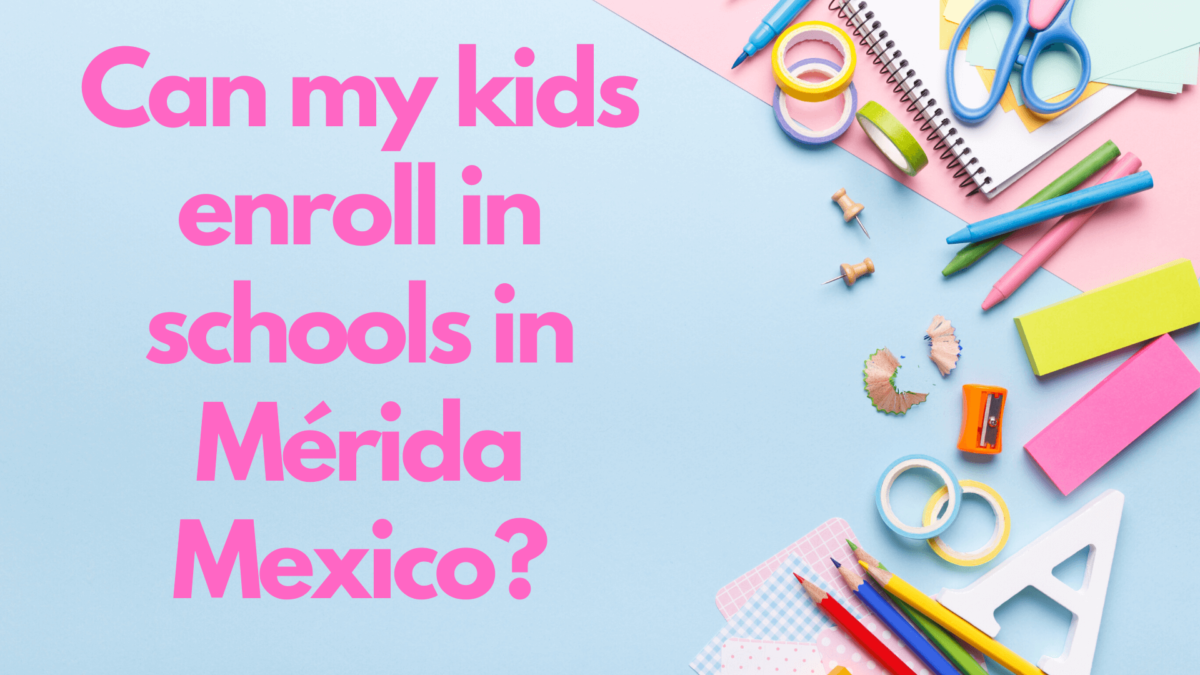Sharing is caring!
Moving with your school-age children can be the experience of a lifetime, especially in a new environment. Learning a new language, a new culture, and being around multi-cultural students can expand a child’s entire perspective. While you may not be considering a permanent move, enrolling a child in school in another country can be a wonderful foundation for a lifetime of curiosity, travel, and knowledge. If you are thinking about Mérida, you may be asking, “Can my kids enroll in schools in Mérida Mexico?” – the answer is Yes.
This article was updated in January of 2023.
Spanish Schools in Mexico
There are numerous Spanish language schools if you are moving to Mexico. Whether you are a beginner or intermediate learner, you’ll find different dialects and pronunciations in different regions of Mexico.
MOST IMPORTANTLY, learn basic and necessary phrases along with simple, conversational Spanish. When you are able to lock a country’s language, even at a basic level, it will improve your experience here in Mérida tremendously.
Living in Mérida with school-age children
It is true, there are many people who come to Mexico and bring their school-age children with them. For some, it is an educational experience. For others, it is for a job transfer. Still, others view living in a foreign county as a wealth of opportunity: a new language, a new culture, and a new foundation for life.
It is not necessary to know Spanish before moving to Mérida. In fact, it may be a bonus if you don’t know Spanish. Just as in the U.S. with different accents, regions of Mexico have different dialects. It may be easier to learn the dialect and Spanish of the area where you will be living, such as Mérida, vs. learning words and phrases that aren’t widely used in your area.
Additionally, learning a new language is easier at a young age. It is also easier when you are immersed in the language, the culture, and the community to use in daily and frequently. Fluency is achieved must faster in this type of environment.
Home-school options in Mexico
While some parents choose to home-school their children for the first year, it is a personal choice. This is to help the child acclimate to the new country and new culture. Specifically, every child is unique and every family has a different dynamic.
Of course, use your best judgment if you are bringing school-age children to Mexico. You may find home-school is best for one child, while another child would thrive in a school environment. Only you will know the best choice for your children.
- Equip and arm yourself with as much information as you can.
- Research the different types of schools and learning platforms.
- Talk to other parents who have moved with their children to get their feedback.
- Visit and interview multiple schools to find the one you are most comfortable with (ie: the closest school may not be the best one for your child or children).
- Explore opportunities to connect with other families for social interactions and gatherings, if you decide home-school is best.
No laws prohibit homeschooling in Mexico. If you’d like more details,
visit the Home School Legal Defense Association (HSLDA) website at https://hslda.org/
English speaking Spanish tutors
You’ll find there are many English-speaking Spanish language tutors in Mérida. With a population hovering around 1,000,000, you’ll find tutors for all levels of learning. You may also want to double up with a tutor in the evenings or on the weekends. Additionally, you’ll find the cost of tutors very affordable. They offer a wide range of services so take some time and compile your findings. You may even want to give a few tutors a trial run to find the best match for your family.
There are also opportunities to learn the Mayan language. Mayan is the native, indigenous language that has very unique qualities. I’m told Mayan can be quite hard to learn. Learning Spanish first would prepare a great foundation if you’d like to learn Mayan too. Take it slow, be patient with yourself and your child.
Expatriates in Mérida Mexico with school-age children
Many expats who move to Mérida choose to enroll their children in international schools. These schools provide kindergarten through 12th-grade education. Another benefit of international schools is they offer entrance exams for American colleges such as SAT and ACT. Additionally, the GSCE A-Level exams are available as well.
Advanced Placement (AP), International Baccalaureate (IB), and Cambridge IGCSE are generally taught in English and Spanish. Certification from these schools is accepted worldwide for university entrance.
Snapshot of schools in Mexico
It’s good to understand the division of the different grades in Mexico and the U.S.
U.S.:
- Kindergarten
- Primary – first, second third, fourth, fifth, and sometimes sixth grades
- Junior High School – sixth, seventh, eighth, and sometimes ninth grades
- High School – ninth, tenth, eleventh, and twelfth grades
Mexico:
- Kindergarten called Jardin de Niños translated as ‘garden of children’ (I just think that is too sweet.)
- Primary is called Primaria with the same grades as above
- Junior High School is called Secundaria with the same grades as above
- High School is called Preparatoria with the same grades as above
In Mérida, there are more than a few primaria and secundaria schools that welcome English-speaking children. They also offer English-speaking teachers and/or programs to help children with their transition. Preparatoria is a bit different in the fact that only a few will make allowances for English language students.
Mérida Public Schools and Education
The Secretariat of Public Instruction or in Spanish, Secretaria de Educacion Publica (SEP) oversees all the public school system in Mexico. Ages 6 through 15 have mandatory attendance requirements. There are pre-primary options for children between 3 and 5 years, considered basic education.
When a student reaches the age of 16, they have the option to continue their education at the high school level.
At this level, there are two options for a degree:
- The least popular option is a qualified technician degree or profesional tecnico. This is chosen by less than 10 percent of all students.
- The most popular option is a high-school diploma or bachillerato.
You will find both public and private schools available in Mérida. Not surprisingly, public schools will not provide support for a non-native speaking child. In the U.S., ESL or English as a Second Language programs are available in public schools. In Mexico most, if not all of the time, this is not a program that is available.
It’s also important to keep in mind that between three and seven years of age, language acquisition is easier with less academic stress. Additionally, children of this age seem to be more adaptable and flexible with change, a new culture, and a new environment. Middle school-aged child or teenager may or may not be as adaptable and flexible.
Enrolling a Child in Schools in Mérida Mexico
To enroll a child in school in Mérida, whether public or private, you must show proof he or she has successfully completed the previous school year. This and therefore is eligible to continue on to the next grade level. If there are no school records available, or the student does not pass final examinations, they have to repeat the previous year.
The school will ask for a copy of the child’s birth certificate, a copy of school records showing completion of the previous year of study, and photo identification for the child and for the parent. Please note, if your child has been homeschooling in the states independently of any school system, you must create an official report for him or her that is validated in a way acceptable to the school.
Mexican public school hours are typically from 8 a.m. to 1:00 p.m. Private school hours commonly follow the North American norm of 8 a.m. to 2:30 p.m. While private schools have independent control over curriculum and hours of operation, they must adhere to the same government-mandated guidelines for enrollment.
Requirements and Documentation for Enrollment
- Completed Application (in Spanish)
- Passport-sized recent photos (approx 2.5-inch square)
- Original birth certificate
- Letter of Conduct from the preceding school
- Copy of the student’s latest report card
- Parent meeting
- Psychological and academic level assessment report
- Personal interview with the Principal
- Developmental and conduct questionnaire
- Clinical or medical history
- Entrance Exam results (when applicable)
Cultural Issues and Helping Children Adjust to Schools in Mexico
It’s ok to not be familiar with Spanish and can actually be a positive thing. As a newcomer, you will see the Mexican culture from a new and fresh perspective. Additionally, learning the local dialect is better than having to relearn Spanish from another region. Part of the Mexican culture is wanting to help. More than likely, you’ll find an abundance of assistance for numerous things to help you settle into your new life.
As you get a feel for the local culture, so will your child. Children are very resilient so relying on your intuition to help your child when they need it is part of growing up, no matter where you live. Remember to put yourself if their shoes and think about how you would react and respond.
Is your child’s peer group mainly locals? a combination of locals and expats? mostly expats? Knowing the dynamic of their peer group will help tremendously as you support them through any issues.
Assimilation into the culture and helping your child deal with any cultural issues will most definitely set them up for success.
Make no mistake about it . . .
Having challenging moments is part of the process. How you adapt and the resources you utilize will be the best tools for long-run survival. Coping as an expat family, and your family’s mental and emotional health depends upon it. As you and your family integrate with Mexican families in your community, life will even out. Soon Mérida Mexico and schools in Mérida Mexico will feel more like home!
Private School Fees in Mexico
Just like many other private schools, you’ll find the private schools a tad on the expensive side according to Mexican standards. This includes international, foreign, bilingual, and bicultural schools. Some schools publish their fees online. Not surprisingly, fees will vary from school to school.
In addition to the tuition, some schools charge an admission fee for first-time students. Other fees may include returning student fees, school transportation to activities, after-school care, and other school-related items. Of course, fees for books may require a deposit or purchasing them outright for what is needed for each year for schools in Mérida Mexico.
Continuing Education and Universities in Mexico
A great resource, foreign students who wish to improve their Spanish and knowledge of Mexican culture and history can explore Mexico’s National Autonomous University (UNAM). UNAM offers a special school to teach the language, the culture, and the history of Mexico.
In Mexico City, the Centro de Enseñanza para Extranjeros offers a series of intensive language and culture study courses. Diploma courses are also offered on-site and open learning. Choose from art, literature, and other subjects. Admission and tuition fees are more expensive, but reasonable for foreigners.
Notably, other universities in Mexico with international programs and admission for foreign students include:
- Instituto Tecnologico de Estudios Superiores de Monterrey or El Tec
- Universidad Iberoamericana or La Ibero
- Instituto Tecnologico Autonomo de Mexico or ITAM
- Universidad de las Americas, Puebla
Resources and information for schools in Mexico
As you research all options for schools for your children, here is some additional information that you may find helpful:
- Directory of Foreign Consulates in Mexico will typically keep a list of local private schools. It is recommended to contact two or three different foreign consulates to compare lists.
- The U.S. Embassy in Mexico has a list of schools frequently attended by children of U.S. citizens. Check for this information at the local embassy of the city you are thinking about living in. Such as Merida or Mexico City, for example.
- The Association of American Schools or ASOMEX in Mexico has member schools in other cities around the country.
Schools in Mérida Mexico
Along with bilingual schools in Mérida Mexico, you’ll find International Schools such as Madison International School Mérida and the American School Mérida Mexico. Here are some other schools available for further research and information.
Agora Comunidad Educativa
Phone: 999 252 0214
Phone: 999 316 0386
Email: admisiones@agora.edu.mx
Levels: Day Care, Preschool, Kindergarten, Elementary & Junior High (to 9th grade)
Website: www.agora.edu.mx
From Agora:
“Agora is a bilingual school with a socio-constructivist model based on competencies children acquire through their lives. Their mission is to include parents, teachers, and children in school to improve the quality of the child’s education.”
Alianz
Phone: 999 252 5520
Phone: 999 316 0386
Email: admision@alianz.edu.mx
Levels: Day Care, Preschool, Kindergarten, Elementary & Junior High (to 9th grade)
Website: www.alianz.com.mx
From Alianz:
“Alianz is a bilingual school following a social constructivist methodology. In addition to regular curricular classes, they also teach art, cooking, and sports.”
Centro Educativo Piaget
Phone: See website for phone numbers for each level of education
Email: See website for email addresses for each level of education
Levels: Preschool, Kindergarten, Elementary, Junior High & High School
Website: www.piaget.edu.mx
From Piaget:
“The Piaget Educational Center’s intention is to be an educational institution of excellence, recognized for its intellectual solidity and organized based on a set of principles that, brought to life, allow our graduates to be characterized by:
- critical capacity and creativity
- openness and your readiness for lifelong learning
- ability to lead their own lives and to understand and show solidarity with others
- courage to act in accordance with your convictions
- ability to contribute to the construction of a better and fairer society
Centro Educativo Renacimiento (CER)
Daycare & Kindergarten Phone: 999 944 7596
Elementary & Junior High Phone: 999 944 4808
Email: info@renacimiento.edu.mx
Levels: Day Care, Preschool, Elementary & Junior High (to 9th grade)
Website: www.renacimiento.edu.mx
From The Renaissance Educational Center (C.E.R.):
” C.E.R. is an institution with more than 30 years of experience in providing quality bilingual education, backed by the teaching of universal human values. As our philosophy says, we want to train children and young people aware that they are unique in the world, with enough tools to be agents of change, to set goals that benefit their environment and society, to ensure their opportunities for success in life. Our teaching methodology seeks that students are active agents of their learning, giving them the opportunity to acquire meaningful and useful learning for their lives.”
Colegio Americano
Phone: 999 928 5509
Email: ingles@americanomerida.edu.mx
Levels: Preschool, Elementary, Junior High & High School
Website: www.americanomerida.edu.mx
From Colegio Americano:
“To train students with high academic standards and solid principles. Through the use of current technologies, the school is at the forefront of education, contributing to the education of the student in the face of the challenges of modern life. To achieve this, the official study plans are complemented by internal educational programs, considering the following areas: English, sports, school visits, excursions, values, DARE, social responsibility, computing, and robotics.”
Colegio Iberoamericano de Merida, A.C.
Phone: 999 925 2712
Levels: Preschool, Elementary, Junior High & High School
Website: www.iberomerida.com
From Colegio Iberoamericano de Merida:
“Conceiving psychomotricity as a methodology, we accompany girls and boys to move and develop their learning skills, to lay firm foundations in their lives.”
Colegio Peninsular Roger’s Hall
Phone: 999 944 5364
Email: info@rogers.edu.mx
Levels: Preschool, Elementary, Junior High & High School
Website: www.rogers.edu.mx
From Colegio Peninsular Roger’s Hall:
“More than a school, we are a great educational family that seeks to develop the best of each of us and put it at the service of others. From our origins, we are a secular and mixed school that promotes inclusion and respect for diversity. We care about providing students with a comprehensive education, forming dynamic, creative, thoughtful human beings, with an excellent academic background and a strong vocation of service to their community.”
Educrea
Phone: 999 925 7931
Email: contactoeducrea@educrea.edu.mx
Levels: Preschool, Elementary, Junior High & High School
Website: www.educrea.com.mx
From Educrea:
“Our vocation encourages us that our students obtain a solid culture, develop their capacities, and obtain abilities and virtues so that they advance in life with success and generosity. That is why EDUCREA encourages meaningful and quality learning. That is why we care about their human, sports, and creative development. Likewise, we favor family unity and we broaden civic awareness in order to form good citizens, in solidarity with their country and with humanity.”
Final Thoughts on Can my kids enroll in schools in Mérida Mexico?
Some expat American and Canadian parents send their children to the local public program in the day or afternoon and home-school English curriculum. In immersion programs, the instructors are trained to deal with issues faced by non-native speakers. They have to be to teach Mexican children English.
The choice of schools is greater in the larger cities, although the time it takes for traveling in traffic can be a limiting factor in choosing a school, reducing the options to those in reasonable proximity to home. Newcomers can choose an area to live that has convenient access to the school they want their children to attend, or conversely, pick a school among those in the area of the city where they live.
Most of the bicultural schools offer a combination of foreign systems (American, British, or others) with Mexican education. At higher school levels, several include the internationally recognized International Baccalaureate course. This is useful for foreign students who live temporarily in Mexico, or Mexican students who wish to pursue further education abroad.
Schools in Mérida Mexico offer many educational options for your family, including public schools, private schools, and international schools.









